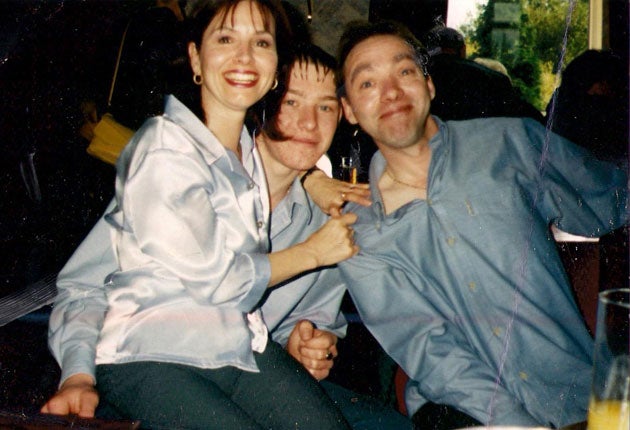Family hope inquest will end prison murders
Michael Clegg died while sharing a cell with a violent arsonist, two years after a killing in the same jail

Just one day after Michael Clegg was discharged from a psychiatric hospital, he found himself in Leeds prison. Mr Clegg, 48, a mechanical engineer with no previous criminal record, was remanded in custody for an alleged assault on his wife because no place was available in a suitable probation hostel. The vulnerable father-of-three was shocked but thought he would have to wait only a few days to be reunited with his family. Less than two weeks later, he was dead.
Just after 5am on 9 May 2006, his family answered the door to the Leeds' prison governor flanked by police officers who told them Mr Clegg had been found hanging in his cell. Initially they were told it looked like suicide, despite the fact that Mr Clegg's buttocks were marked with stab wounds and his cellmate's semen. But within days a murder investigation had been launched.
Neil Preece-Smith pleaded guilty to aiding and abetting suicide in February 2007. In passing a 10-year sentence, the judge described him as an "extremely dangerous man" who bullied and humiliated his vulnerable cellmate into committing suicide. The Clegg family has never accepted the suicide verdict.
After a four-year wait, an inquest opens tomorrow amid claims the Prison Service has failed to learn the lessons from previous violent deaths which should have saved Mr Clegg's life.
Preece-Smith, 24, was serving a life sentence for arson with intent to endanger life after setting fire to his probation hostel in Wakefield on 1 January 2006.
A young man with a long criminal record, he posed a high risk to the public, according to a pre-sentencing report by his probation officer, which prison officers should have seen. He had also threatened to hurt Mr Clegg in the days leading up to his death – a fact recorded in his prison notes.
Nevertheless, Mr Clegg was allocated a cell to share with the convicted arsonist. Cell sharing is common because of overcrowding but according to prison rules, remand prisoners should not be forced to share with a convicted prisoner.
If sharing is unavoidable, the prison must undertake and regularly review a Cell Sharing Risk Assessment (CSRA) for each prisoner to ensure the arrangement is safe for both. Mandatory CSRAs were introduced after the murder of Zahid Mubarek, 20, at Feltham Young Offenders Institute by a cellmate in 2000. Since then, several murders and countless assaults have highlighted shortcomings in the way CSRAs are carried out and used by prison staff.
Mr Clegg died two years after Shahid Aziz had been murdered in the same prison. A report by the Prison and Probation Ombudsman into Mr Aziz's murder, published in October 2005, criticised the quality of CSRAs at Leeds. The report recommended urgent action to improve the timing, quality and use of CSRAs, to ensure violent prisoners were not put into cells with others.
Coroner David Hinchcliff, who also sat on the Aziz inquest, will hear evidence from 100 witnesses over the next seven weeks, and must decide whether Leeds prison acted on the Aziz report recommendations when ruling on the cause of death.
Daniel Machover, the Aziz family's solicitor, believes not: "It is extraordinary that this keeps happening again and again because the prison service fails to learn the most urgent lessons."
The murder of Ryan Beaver, 35, in Salford's Forest Bank prison in September 2008 by a cellmate who had previously threatened to assault him, suggests the failings are widespread. A review of CSRAs is under way.
Mr Clegg attended two bail hearings during his 12 days in prison, but no hostel was found for him. Another hearing was due on the day he was found hanging. The next morning his mother received a bogus letter, written by Preece-Smith pretending to be her son. She never recovered from her son's untimely death and died in 2008.
Mr Clegg's younger sister, Sue Winder, 46, said: "To see my mum, at the age of 70, fall to the floor when that governor told us Michael was dead, well, that haunts me more than anything. But even then I knew this wasn't suicide. He would never do that to his kids or our mam; never. And I still believe that.
"The prison let us down, they all did. If something can be learnt from Michael's death which saves one life and just one family going through what we have, then something would have come of it. It has to stop somewhere, and we want to change things."
Philippa Matthews of Howells Solicitors, who represents the Clegg family, said: "The state has an obligation to protect life and also to properly investigate any prison death.
"The investigation must see if lessons can be learned. Michael's family hope that the inquest will provide them with reassurances that systems are in place at Leeds prison to prevent vulnerable prisoners from being placed in double cells with others who could cause them harm."
Join our commenting forum
Join thought-provoking conversations, follow other Independent readers and see their replies
Comments